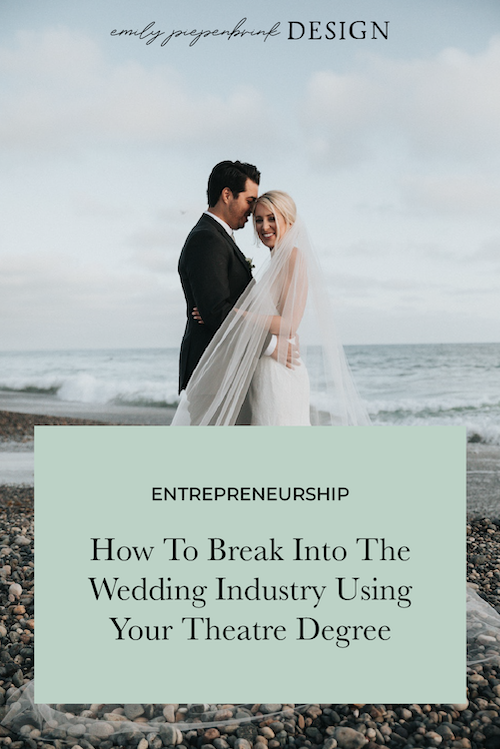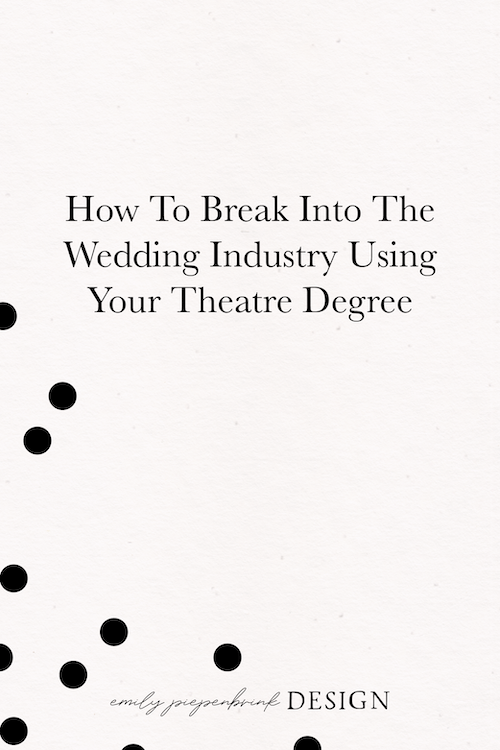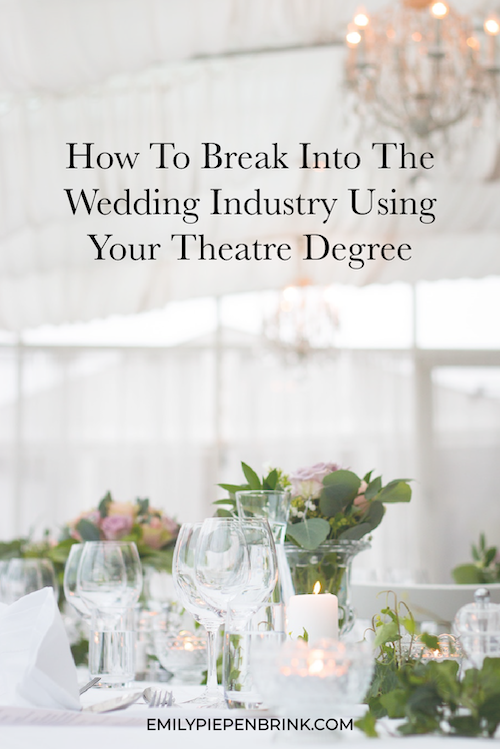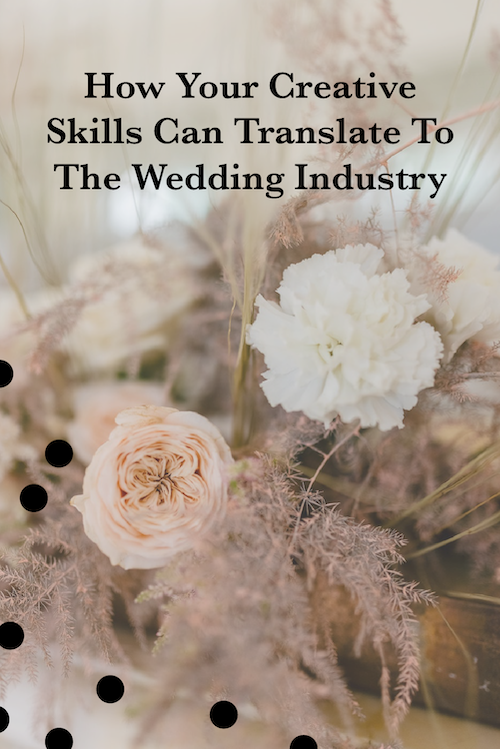How To Break Into The Wedding Industry Using Your Theatre Degree
I have two degrees in Theatre that I get a significant amount of flack for. Emily, what on earth will you ever do with your theatre degree? Emily, don’t you wish you hadn’t gotten that Master’s degree in theatre? Emily, surely, your theatre studies never come in handy. I’ve heard it all, and if you have a theatre (or even a liberal arts) degree, I’m sure you have too.
But here’s my truth: my theatre education has been a massive reason why I’m so successful in my entrepreneurial journey.
Theatre, liberal arts, and artistic disciplines in general have a real PR problem. Folks seem to think we just drift around, dress up in costumes, make art projects out of trash, etc. When, actually, most theatre students leave college having already learned and used basic business skills: organization, public speaking, marketing, and project management. We learn this by working inter-departmentally on performances and theatre seasons, acting on stage and in class, tracking timelines and budgets for shows, and doing everything we can think of to put butts in seats to watch those shows.
Additionally, as theatre students we usually leave even a Bachelor’s program with hard skills, like construction, sewing, painting, designing, and programing with the myriad of software platforms needed to design a performance. These skills are so often undervalued in our society, but they can be the catalyst for your success.
While I believe that people with theatre and liberal arts degrees are set up for success in entrepreneurship, I especially believe that they can find success in the wedding industry. And, having spent a large portion of my working years in that industry, I’ll let you know that it’s full of theatre people already! You’re going to find a cast of colleagues with similar backgrounds, love of the arts, and similar and complementary skillsets.

How Your Theatre Skills Can Translate To The Wedding Industry
Stepping onto the stage of entrepreneurship in the wedding industry, it may seem like an unlikely performance for those of us with a background in theatre. But, organizing a production really isn’t any different than organizing a wedding. Both revolve around storytelling, emotion, impeccable timing, and creating unforgettable experiences.
1. Creative Problem Solving
Bad dress rehearsals mean great opening nights, right? All of that practice coming up with creative solutions for performance mishaps is going to pay off in the wedding industry. Unlike theatre productions where you have the luxury of rehearsal periods and backstages, working on weddings is a lot more like improv. You’ll need to be able to think on your feet when hiccups occur. And, let me tell you, they will occur.
If a tent pole cleat is hammered into a water pipe that starts flooding, or rain starts right before an outdoor ceremony, or all of the DIY the couple “did” for their wedding shows up on the day of “un-done,” you’re going to be thrilled that you have so much practice coming up with creative solutions. Sometimes, this means thinking of staging or planning work-arounds for a couple’s budget or design desires. Other times, it means dealing with a crisis in the moment, with 100 guests watching you.
Your ability to keep cool and solve problems by thinking creatively is invaluable. If you can meet these challenges, your business will explode. Your reviews will be incredible, and couples will be banging down the door to book you.
2. Visual Storytelling
A lot of people think they’re good at visual design. Now, no one is good at visual design all the time, but it is a skill you learn and hone. Since most theatre degrees require multiple classes in set, costume, lighting, or other design areas, you’ve got more than the basic requirements.
Being about to visual the “stage,” or wedding venue will help you make well-informed design decisions. Sometimes, clients will let you lead the charge, and others will want to heavily influence the design of a wedding. But, being able to explain why something will work, and how much is needed for scale, is an incredible gift you can give clients.
Remember, your clients will be coming to you for knowledge. Whether you’re a florist, planner, or stylist, you’re going to need to demonstrate and explain how your clients can translate their inspirational images to reality on their big day.
3. Collaboration Among Vendors
Being able to collaborate among all of the other wedding vendors a couple has hired is almost exactly like being in a production meeting for a performance. Each vendor will know everything about their own lane, but you’ll work together on areas where you overlap.
So, for example, if you’re a florist, you’ll touch base with the planner and caterer to talk about sizes of arrangements on the tables. You’ll touch base with the cake company if the couple wants florals on the cake.
This is nothing complicated, so long as you’re used to working in a collaborative environment. Being able to “see” issues or overlap before the big day and then address it professionally with other vendors is pivotal. It’s also something that, while it may come naturally to you now, is not a skill everyone has. Value that ability in yourself.
4. Emotional Intelligence
Theatre practitioners often delve deep into the emotions of their characters to deliver authentic performances. This emotional intelligence and empathy are powerful tools in the wedding industry, where you’ll guide couples through one of the most emotional and significant days of their lives. Seriously, you’re going to be hand-holding your clients and their families through some emotional landscapes!
Your ability to empathetically listen (i.e. demonstrating through physical cues that you’re listening) is a great tool. When clients or their families or even another vendor is worked up about something, not only listening but showing that you’re listening is important. They need to feel seen and heard before they’ll calm down enough to listen to your creative problem solving.
You’ll also be relied on for emotional support. I cannot tell you the number of times a couple came to me with familial or emotional issues related to their wedding. Being able to listen to their worries, comfort them, and then offer solutions or ideas, made me a better person and wedding planner. Your emotional intelligence lets you put yourself in another’s shoes.
5. The Show Must Go On
There’s knowing of this phrase, and then there is knowing it way down deep in your bones. No matter what’s happening, what setbacks occurred, what chaos intercedes, the show must go on. This level of grit and determination to see something through, is a mandatory quality in the wedding industry.
There’s no going back on a wedding day. There’s no do-overs. This is a one-night-only performance, and everything needs to be as close to perfection as possible. And whatever your contribution to the day (but especially if you’re the planner), you need to get it done.
You not only need to get things done, but you need to be able to do them professionally and preferably with a smile. This day may be another work day for you, but for someone else it’s a timeless memory. That means, you’re essentially “on stage” the entire time you’re working with the couple and on their big day. The show must go on.
If you’re a former theatre-major looking into entrepreneurship, I highly recommend looking into the wedding industry. Your skills will translate well, and the sky is the limit when it comes to success. Your unique skill set, honed through years of captivating audiences, provides the perfect backdrop for creating enchanting weddings that leave couples and guests with incredible memories. With your theatre-inspired creativity, storytelling prowess, and unwavering dedication, you’re ready to take the stage in the wedding industry.
Helpful Links
- See all my small business resources
- Work with me on your brand and website design
- Shop my illustrations and graphics
- Find inspiration on my Pinterest
- Connect with me on Instagram




Quietly doing good work in my own little corner of the internet.
Having been a visual artist for over 10 years, I know that every part of a brand (even the parts that are often unseen) deserve to be expressed with honesty and beauty. I am happiest standing behind the scenes, creating every design and detail for focused and intentional business owners. I created EP Design to stand beside visionaries and thought leaders who are fueled by joy.